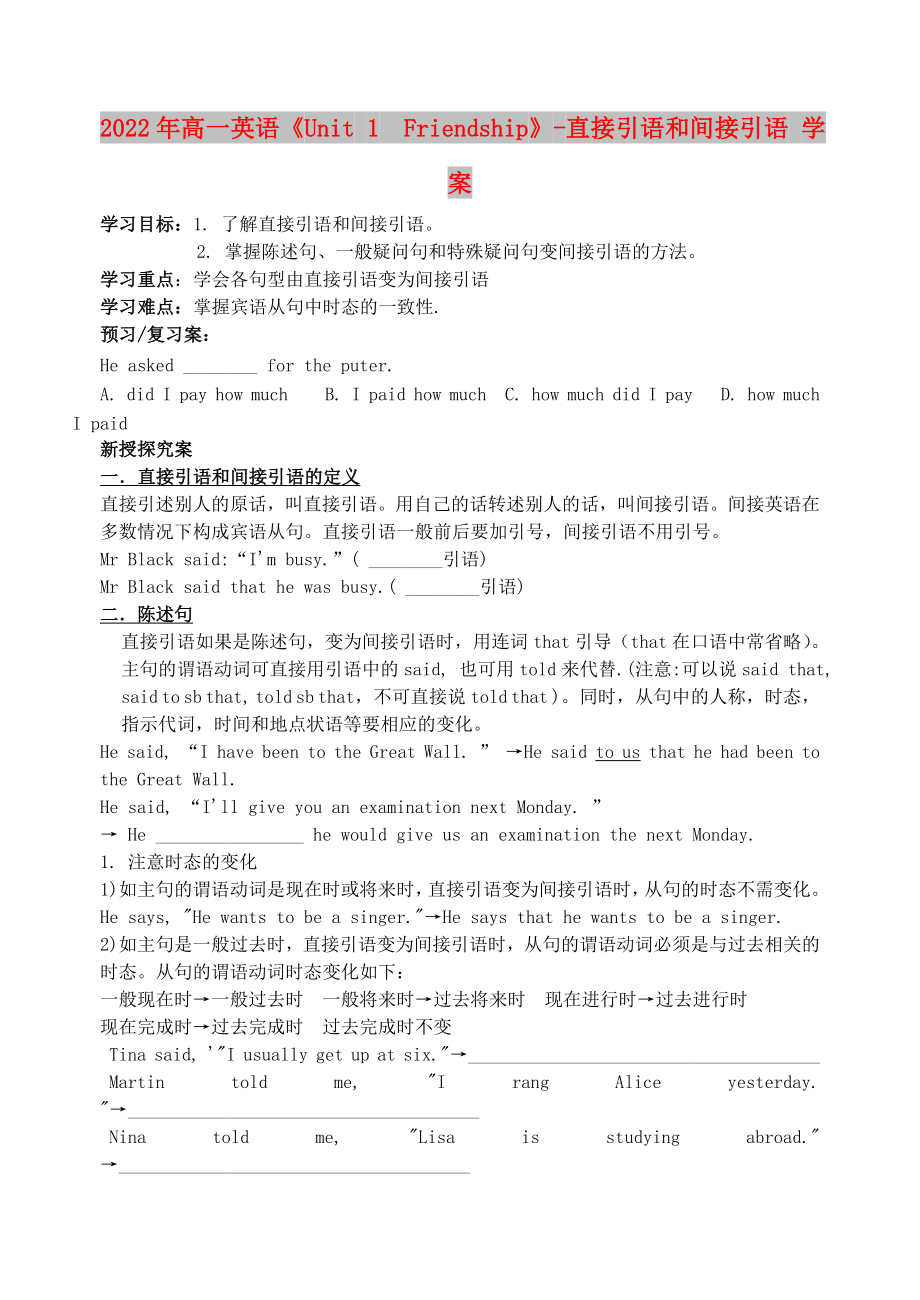《2022年高一英語(yǔ)《Unit 1Friendship》-直接引語(yǔ)和間接引語(yǔ) 學(xué)案》由會(huì)員分享���,可在線閱讀,更多相關(guān)《2022年高一英語(yǔ)《Unit 1Friendship》-直接引語(yǔ)和間接引語(yǔ) 學(xué)案(3頁(yè)珍藏版)》請(qǐng)?jiān)谘b配圖網(wǎng)上搜索�����。
1����、2022年高一英語(yǔ)《Unit 1 Friendship》-直接引語(yǔ)和間接引語(yǔ) 學(xué)案
學(xué)習(xí)目標(biāo):1. 了解直接引語(yǔ)和間接引語(yǔ)。
2. 掌握陳述句���、一般疑問(wèn)句和特殊疑問(wèn)句變間接引語(yǔ)的方法����。
學(xué)習(xí)重點(diǎn):學(xué)會(huì)各句型由直接引語(yǔ)變?yōu)殚g接引語(yǔ)
學(xué)習(xí)難點(diǎn):掌握賓語(yǔ)從句中時(shí)態(tài)的一致性.
預(yù)習(xí)/復(fù)習(xí)案:
He asked ________ for the puter.
A. did I pay how much B. I paid how much C. how much did I pay D. how much I paid
新授探究案
一.直接引
2����、語(yǔ)和間接引語(yǔ)的定義
直接引述別人的原話,叫直接引語(yǔ)�。用自己的話轉(zhuǎn)述別人的話,叫間接引語(yǔ)��。間接英語(yǔ)在多數(shù)情況下構(gòu)成賓語(yǔ)從句。直接引語(yǔ)一般前后要加引號(hào)���,間接引語(yǔ)不用引號(hào)����。
Mr Black said:“I'm busy.”( ________引語(yǔ))
Mr Black said that he was busy.( ________引語(yǔ))
二.陳述句
直接引語(yǔ)如果是陳述句��,變?yōu)殚g接引語(yǔ)時(shí)��,用連詞that引導(dǎo)(that在口語(yǔ)中常省略)��。主句的謂語(yǔ)動(dòng)詞可直接用引語(yǔ)中的said, 也可用told來(lái)代替.(注意:可以說(shuō)said that, said to sb that, told sb that
3�����、���,不可直接說(shuō)told that )。同時(shí)��,從句中的人稱���,時(shí)態(tài)��,指示代詞����,時(shí)間和地點(diǎn)狀語(yǔ)等要相應(yīng)的變化。
He said, “I have been to the Great Wall. ” →He said to us that he had been to the Great Wall.
He said, “I'll give you an examination next Monday. ”
→ He ________________ he would give us an examination the next Monday.
1. 注意時(shí)態(tài)的變化
1) 如主句的謂語(yǔ)
4��、動(dòng)詞是現(xiàn)在時(shí)或?qū)?lái)時(shí)����,直接引語(yǔ)變?yōu)殚g接引語(yǔ)時(shí),從句的時(shí)態(tài)不需變化�����。
He says, "He wants to be a singer."→He says that he wants to be a singer.
2) 如主句是一般過(guò)去時(shí)���,直接引語(yǔ)變?yōu)殚g接引語(yǔ)時(shí)����,從句的謂語(yǔ)動(dòng)詞必須是與過(guò)去相關(guān)的時(shí)態(tài)�����。從句的謂語(yǔ)動(dòng)詞時(shí)態(tài)變化如下:
一般現(xiàn)在時(shí)→一般過(guò)去時(shí) 一般將來(lái)時(shí)→過(guò)去將來(lái)時(shí) 現(xiàn)在進(jìn)行時(shí)→過(guò)去進(jìn)行時(shí)
現(xiàn)在完成時(shí)→過(guò)去完成時(shí) 過(guò)去完成時(shí)不變
Tina said, '"I usually get up at six."→___________________________
5���、___________
Martin told me, "I rang Alice yesterday. "→______________________________________
Nina told me, "Lisa is studying abroad." →______________________________________
Nell said, "I have worked out this problem." →______________________________________
2. 注意人稱變化��,指示代詞����,時(shí)間狀語(yǔ),地點(diǎn)狀語(yǔ)和動(dòng)詞的變化
指
6�����、示代詞 this→that, these→those,
時(shí)間狀語(yǔ)now→then, today→that day, this week→that week, yesterday→the day before, last week→the week before ,four days ago→four days before ,the day before yesterday→ two days before ,tomorrow→the next day, next month→the next month.
地點(diǎn)狀語(yǔ)here→there 動(dòng)詞的變化e→go, bring→take
H
7�����、e said, "I like it very much."→______________________________________
Toby said to me, "This is the School puter Center."→_______________________________
The boy said, "I put all the things there."→________________________________
My sister asked me, "Could you bring the chairs upstairs�����?"→_______
8�����、____________________
注意:直接引語(yǔ)變間接引語(yǔ)時(shí)���,以下情況時(shí)態(tài)不需變化��。
1. 直接引語(yǔ)表述的是客觀真理,諺語(yǔ)���、格言
The geography teacher told us that the sun rises in the east and sets in the west.
My father told me that a friend in need is a friend indeed.
2. 直接引語(yǔ)帶有具體的過(guò)去時(shí)間狀語(yǔ) He said that his father was born in 1995.
3. 直接引語(yǔ)中有情態(tài)動(dòng)詞should,
9、would, could, had better, might, must, need����,used to等
He told me that I had better get up early.
4. 當(dāng)直接引語(yǔ)中有以when, while引導(dǎo)的從句,表示過(guò)去的時(shí)間時(shí)
? He told me that he was watching TV when he came in.
三.疑問(wèn)句
如果直接引語(yǔ)是疑問(wèn)句�����,變?yōu)殚g接引語(yǔ)時(shí)�,要把疑問(wèn)句語(yǔ)序變?yōu)殛愂鼍湔Z(yǔ)序(即主語(yǔ)在謂語(yǔ)的前面)
1)一般疑問(wèn)句 間接引語(yǔ)用連詞whether或if引導(dǎo),原主句中謂語(yǔ)動(dòng)詞said要改為asked
10����、(me/him/us等),疑問(wèn)句語(yǔ)序變?yōu)殛愂鼍涞恼Z(yǔ)序
He said, “Do you have any difficulty with pronunciation?”
→He asked (me) whether/if I had any difficulty with my pronunciation.
He said, “Are you interested in English?” →He __________________interested in English.
2)特殊疑問(wèn)句 原來(lái)的疑問(wèn)詞作為間接引語(yǔ)的連詞�����,主句的謂語(yǔ)動(dòng)詞用ask(sb. )來(lái)表達(dá)��,疑問(wèn)
11�����、句語(yǔ)序改為陳述句語(yǔ)序
He said to me,“What's your name?” →He asked me what my name was.
He asked us, “How many car factories have been built in your country?”
→He asked us_____________________________________________
3) 選擇疑問(wèn)句 用whether…or…表達(dá)��,而不用if…or…�����,也不用either…or…
He asked, “Do you speak English or Fr
12�、ench?” →He asked me whether I spoke English or French.
當(dāng)堂檢測(cè)案:把下列直接引語(yǔ)改為間接引語(yǔ)
1.He said: “I’ve left my book in my room.”
2.She said: “He will be busy.”
3.She said to Tom, “Can you help me?”
4.She asked, “Is this book yours or his?”
5.The teacher asked, “how did you repair it?”
課后練習(xí)案:完成導(dǎo)學(xué)案直接引語(yǔ)和間接引語(yǔ)(2)
學(xué)后感:
 2022年高一英語(yǔ)《Unit 1Friendship》-直接引語(yǔ)和間接引語(yǔ) 學(xué)案
2022年高一英語(yǔ)《Unit 1Friendship》-直接引語(yǔ)和間接引語(yǔ) 學(xué)案

